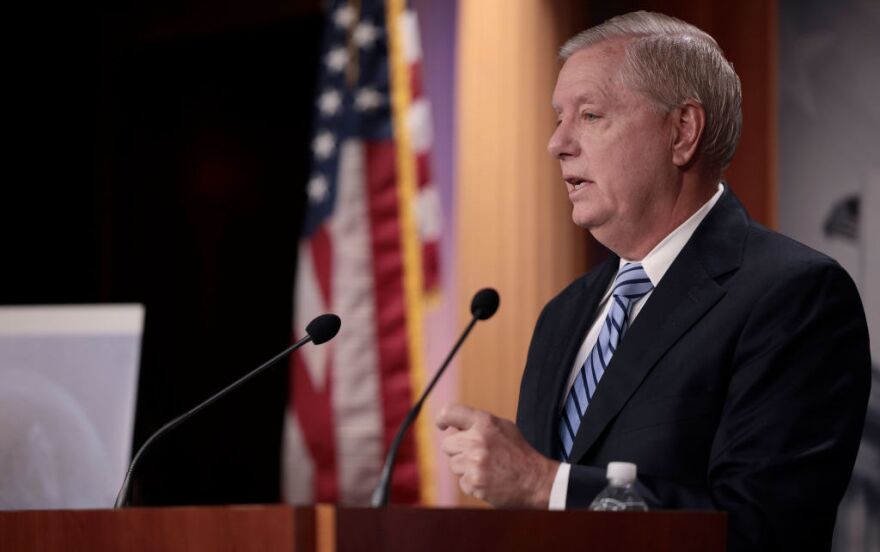Updated March 4, 2022 at 3:13 PM ET
Sen. Lindsey Graham's suggestion that Russians should assassinate President Vladimir Putin has drawn the ire of Republicans and Democrats concerned over the war in Ukraine.
"Is there a Brutus in Russia? Is there a more successful Colonel Stauffenberg in the Russian military?" the South Carolina Republican asked in a tweet.
Roman Emperor Julius Caesar was assassinated by Brutus and others in the Rome Senate on the Ides of March. Graham was also referring to German Lt. Col. Claus von Stauffenberg, who tried to kill Adolf Hitler in the summer of 1944.
"The only way this ends is for somebody in Russia to take this guy out. You would be doing your country - and the world - a great service," Graham said.
Asked about the remarks during the White House news briefing on Friday afternoon, press secretary Jen Psaki said, "That is not the position of the United States government and certainly not a statement you'd hear come from the mouth of anybody working in this administration."
Among lawmakers concerned over Graham's suggestion were Rep. Ilhan Omar, D-Minn., and Sen. Ted Cruz, R-Texas.
"I really wish our members of Congress would cool it and regulate their remarks as the administration works to avoid WWlll. As the world pays attention to how the US and it's leaders are responding, Lindsey's remarks and remarks made by some House members aren't helpful," Omar tweeted.
"This is an exceptionally bad idea," Cruz tweeted in response to Graham's remarks. "Use massive economic sanctions; BOYCOTT Russian oil & gas; and provide military aid so the Ukrainians can defend themselves. But we should not be calling for the assassination of heads of state."
Graham made similar remarks on television Thursday night.
Holy: Lindsey Graham just called for Putin’s assassination. pic.twitter.com/UNvOJIApXV
— Kambree (@KamVTV) March 4, 2022
Assassination during military conflict is specifically forbidden by the Lieber Code, which President Abraham Lincoln issued as a general order for U.S. forces in 1863.
Section IX of the code states that the laws of war forbid declaring a member of a hostile force or a citizen or subject of a hostile government to be an outlaw "who may be slain without trial."
"Civilized nations look with horror upon offers of rewards for the assassination of enemies as relapses into barbarism," according to the Lieber Code, which underpins international conventions on warfare.
Graham's remarks drew wide attention and criticism. In response, U.K. Prime Minister Boris Johnson's office said he believes Putin should be held responsible for any war crimes committed, citing an investigation by the International Criminal Court.
The senator's communications director, Kevin Bishop, sought to clarify his comments.
Graham "also expressed he was okay with a coup to remove Putin as well," Bishop said. "Basic point, Putin has to go," he said, adding that the Russian people should find the "off ramp" to the international crisis.
A version of this story originally appeared in the Morning Edition live blog.
Copyright 2022 NPR. To see more, visit https://www.npr.org.




